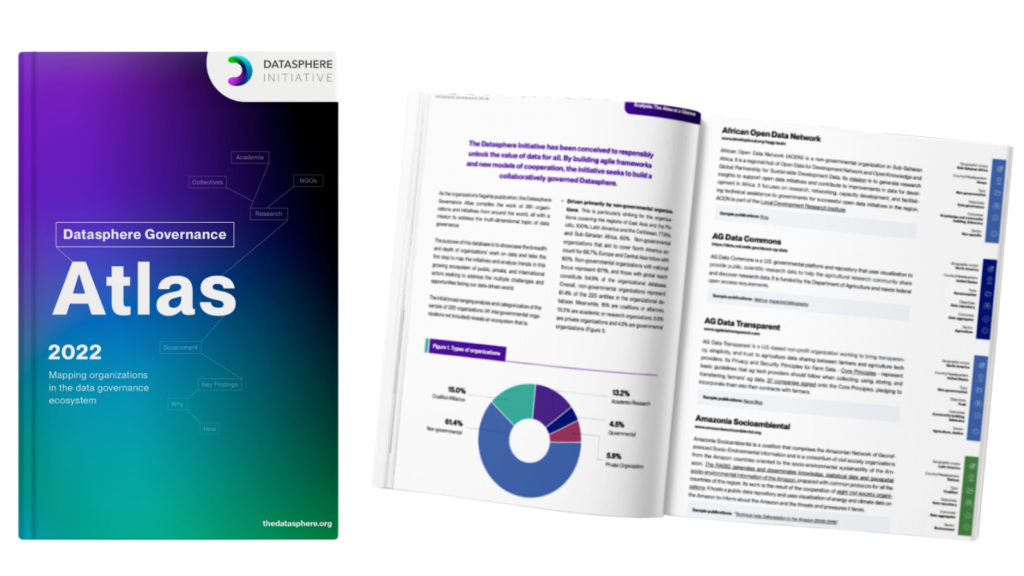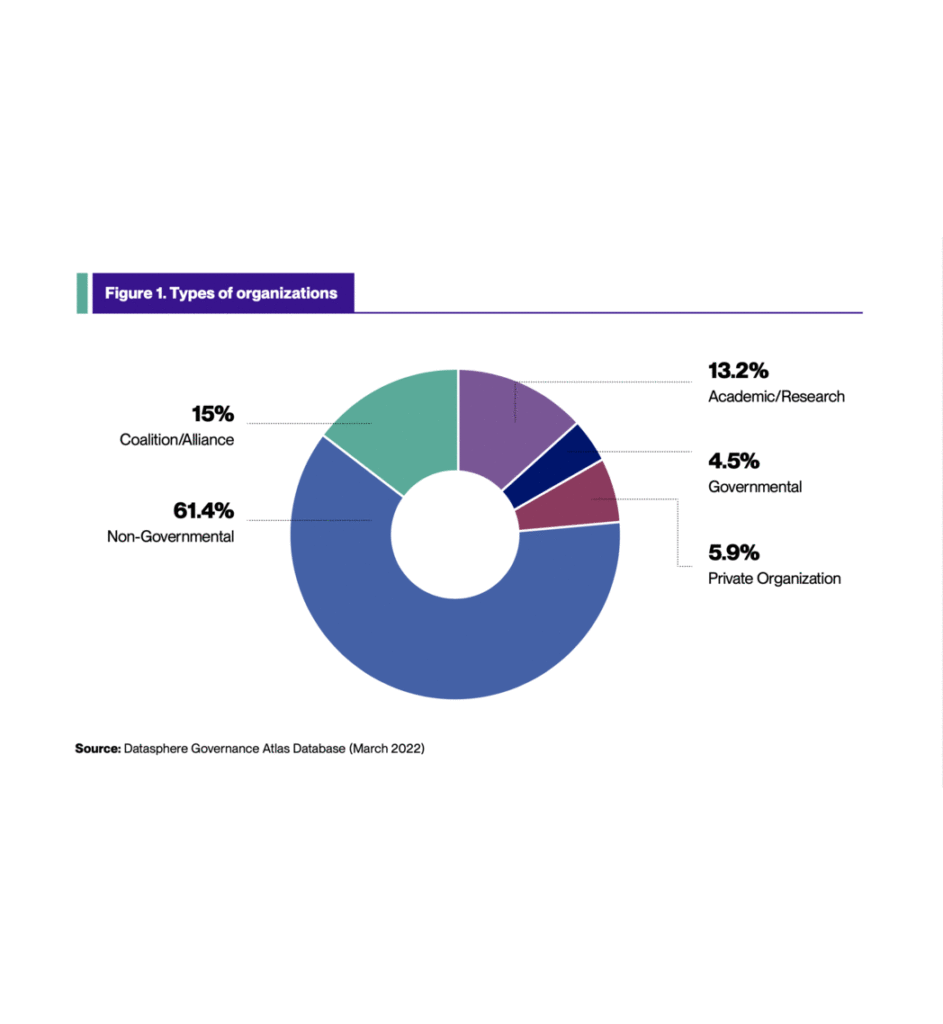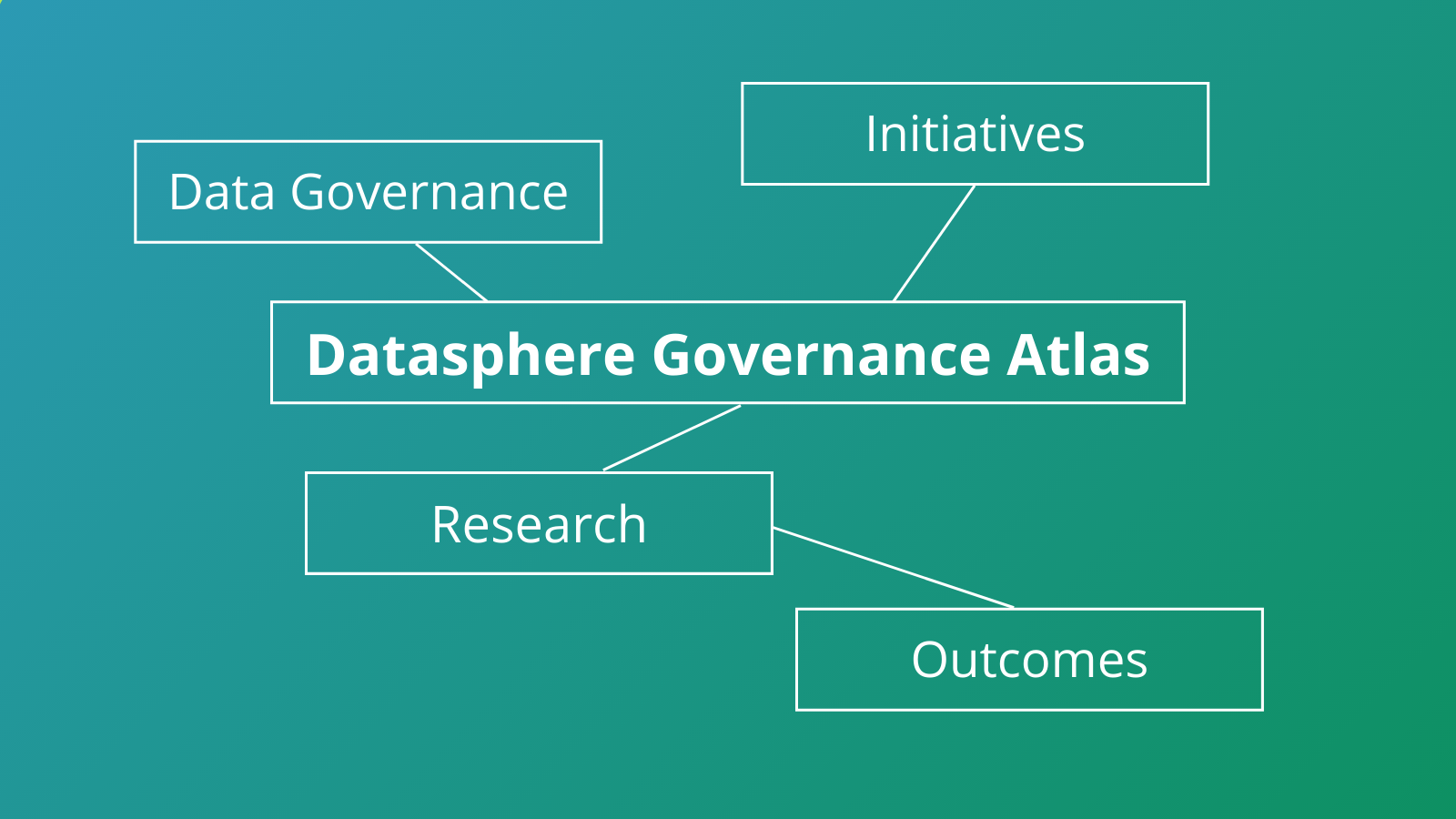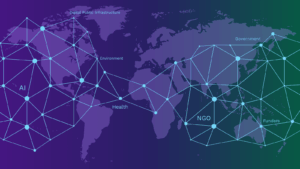Carolina Rossini, Director of Partnerships and Research, Datasphere Initiative
In the past 30 years, the amount of organizations seeking to impact how data is governed and managed has grown tremendously. To explore this paradigm shift the Datasphere Initiative embarked on an incredible learning journey to understand how different actors are influencing data governance, and to take a first step to map the Datasphere – the complex system encompassing all types of data and their dynamic interactions with human groups and norms itself.
The result, the Datasphere Governance Atlas, is the first flagship report of the Datasphere Initiative and provides a one-stop-shop resource that shines a spotlight on the expanding community of organizations and initiatives working on data governance.
Released during the Datasphere Initiative launch event on April 5, 2022 on the occasion of the G7 Multi Stakeholder conference hosted by the Federal Government of Germany in Berlin, the Datasphere Governance Atlas 2022 showcases a total of 261 organizations from around the world. The report identifies geographic scope, key objectives, the type of organization and the sectors they cover, as well as the outcomes from their work. The report highlights how today data governance concerns not only the rules and operational procedures for data management, but also policies, regulations, and a complex set of impacting elements within and across countries and continents.
Qualitative analysis was conducted using public information of the 261 organizations sampled. Categorization and quantitative analysis were also developed for a sub-group of 220 organizations (excluding intergovernmental organizations).

From issues of trust, cybersecurity and privacy, to various models of data sharing with different levels of openness and transparency, to the increasing need of interdisciplinarity, the Atlas highlights how the complexity has increased, and the concept of data governance itself has broadened.
This is reflected by the number and breadth of approaches and entities, and by the stories of each of them. Understanding this growth, can support us in comprehending not only the evolution of the field, but also how actors are working and cooperating towards a collaboratively governed Datasphere.
Examples of our findings:
- Type: The work on data governance around the world is driven primarily by non-governmental organizations.
- Geographic Scope: While 56% of the organizations have an intended global reach and impact, the majority is based in the Global North, 62% (137 of 220). This arguably informs us where funding, narrative hegemony and skills may be concentrated.
- Objectives: The leading objective among the organizations is data governance at large, followed by providing data repositories.
- Activities: Two activities dominate across all sectors: research and networking. Here it is interesting to note that providing visualizations is the least used tool among the organizations, even when visualizations are considered a useful tactic to support advocacy and make the invisible visible.
- Outcomes: Organizations main outcomes are knowledge and community building.
- Sector/Focus: In terms of sectoral distribution, most organizations do not cover a specific sector or issue. Meaning – they focus on data governance or elements of data governance at large, developing research, furthering policy issues or providing data governance methodologies that could potentially be applicable to any sector. This is followed by focusing on the sectors of health and environment. This result is slightly different when one crosses the type of organization with sector, with, for instance, a large number of nonprofits focussed on original populations rights

It is also interesting to contrast geographic scope with organizations goals.
From the organizations we have identified we can see that 54% of organizations focused on Europe and Central Asia aim to generate trust by advancing privacy and cybersecurity, while 26.7% focus on data governance at large.
While in North America, 50% are focused on data repositories.
And those working in Africa, 70% of the organizations focus on data governance, and the 30% that follows focus on furthering socio-economic development by using data or by advocating for data sharing in support of the SDGs and better policy making.
These findings provide a first step for further a gap analysis and an indication of the types of needs and priorities of different regions when it comes to what data governance should serve.
Another important feature of the Atlas is the identification of international intergovernmental organizations and their work in this space.
These actors are approaching data governance in the context of their own specific missions and scope.
Several organizations are actively addressing data governance issues, such as the OECD and United Nations agencies. From their role of setting global norms (e.g. novel governance frameworks), processes (e.g. improvement of statistic capacities and interoperability), and structures (e.g. hosting repositories) to culture (e.g. advocating better knowledge and abilities on data for better policy making).
Still, most organizations do not seem to advocate for a particular way on how data should be governed, but almost all of them have an open data portal.
While some efforts are cross-sectoral and focus on data governance at large, most focus on outputs and outcomes related to the organization’s primary field of work.
The Atlas also includes sample publications from the organizations identified.
Finally, to help bring the findings to life the Atlas is accompanied by an interactive dashboard – also available in our website, which will act as a springboard for a larger and ongoing effort to provide an interactive observatory, within our Intelligence Program, to feed the much-needed global, transdisciplinary, and multistakeholder dialogue on data.
The Atlas shows us that there is a need for further cooperation across sectors, regions and organizations when it comes to tackling data governance. Especially if we want to tackle the most pressing challenges of humanity which are not bounded by sector or disciplinary borders.
The Datasphere Initiatives plans to connect communities and provide a platform for organizations to showcase their work on data governance and their role in the datasphere.
Reach out to us at [email protected] for any additional feedback.





